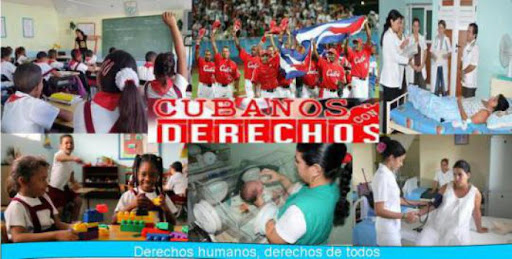Human rights in Cuba: a matter of principle
- Written by ACN
- Published in Cuba
- Hits: 1107

This December 10, Cuba welcomes International Human Rights Day with new milestones marked by a diligent process to score even more victorious achievements under a Revolution that from day one implemented programs in favor of equity and full social justice as an essential question of principle.
These are not mere words, as the Cuban people—and the world—know only too well, based on the recognition of Cuba’s efforts to permanently protect the dignity of women and men regardless of their skin color or political or religious creed. The intention stems from a spot-on and convincing legislation with a glorious precedent in our pro-independence struggles of yore, one which we change and improve from time to time to put it on a par with the demands of life and the characteristics of the new society.
The competent bodies in charge of this task work closely together and through popular consultation, both at home and in international bodies—the UN and the ILO, for example—as well as with progressive movements in solidarity with different nations. Cuba marches on, heeding epochs and values.
In terms of what is known as basic or universal human rights, according to the United Nations, we take a lot of pride in our work, which raised the bar for higher goals. And this is as real as the palm trees, the sun and the Cuban flag that flutters sovereign in the wind.
"The Cuban Revolution can be summarized as an aspiration for social justice in complete liberty and with the most absolute respect for human rights," Fidel Castro said as early as on January 21, 1959, at the dawn of the victory.
Ever since the great fulfillment of the Moncada Program, the historic plan of justice formulated by Fidel in his self-defense in 1953, the nation that builds socialism has implemented a far-reaching and groundbreaking Land Reform and a vast Literacy Campaign that sowed the country with teachers and schools of all kinds to secure our continuity and relief.
Another aspect stood out as a most serious and painful problems: the status of Cuban public health, whose scarce resources at the mercy of corruption and the negligence of those in power resulted in the exclusion of hundreds of thousands of people from health and life, one of the most sacred human rights.
All the visceral changes that the Revolution made in the field of health came together with equitable measures in terms of people’s right to have decent jobs and homes, electricity services, cultural development, etc., and to develop the national economy, largely mono-productive and dependent on the designs of the United States.
This effort, which also entailed the inclusion of the cultural sector, so valuable to the nation’s spiritual fate, was always encumbered with aggressions and attacks organized from the U.S. and crowned since February 1962 with the economic blockade imposed by that imperial power, still in force and further reinforced with more than 240 sanctions enacted by former president Donald Trump.
In this crucial environment, today’s life in Cuba becomes richer with the efforts of its children to build a prosperous, just, democratic and sustainable society as free as it started to be more than 60 years ago.
It is with true conviction that the Cubans embrace José Martí's words when he said, “I want the first law of our Republic to be the cult of Cubans to the full dignity of man”.
The present of true patriots goes beyond the fulfillment of essential rights. As 2022 draws closer after a hard year of pandemic, mitigated by our large-scale vaccination campaign, the Cubans keep striving to approve and improve the legislation emanating from the Constitution of 2019.
Our society has been immersed in the discussion and analysis of a sweeping judicial and procedural reform to enhance and update Cuban laws and in the analysis of the Preliminary Draft of the Family Code, all of which are to be approved in near future.
Cuba has also a commendable history of cooperation with international bodies and institutions, mostly under the auspices of the United Nations and the International Labor Organization (ILO), on key and very specific issues for a greater exercise of freedom and human rights both within the country and in the world. Cuba is a State party to 44 of these instruments, related to anything from the right to work and the prohibition of racial discrimination to laws against discrimination against women, child labor and human trafficking.
The Cuban Constitution recognizes the equality of all citizens and the prohibition of discrimination, whereas the Penal Code punishes all forms of discrimination.
Furthermore, Cuba is signatory of conventions against terrorism, torture and other cruel, inhuman or degrading treatment or punishment, and forced disappearances.
No less important is Cuba’s adherence to the Conventions on the elimination of all forms of discrimination against women and on the Rights of the Child, as well as to the Optional Protocol to the Convention on the Rights of the Child about the participation of children in armed conflicts.
It is impossible to reflect in this space all the richness and humanistic nature of the Cuban Revolution, so I summarize it by saying that the Island’s effort in defense of human rights will continue, as will our struggle for a full, peaceful and happy life. No one other than our people will decide Cuba’s fate.
